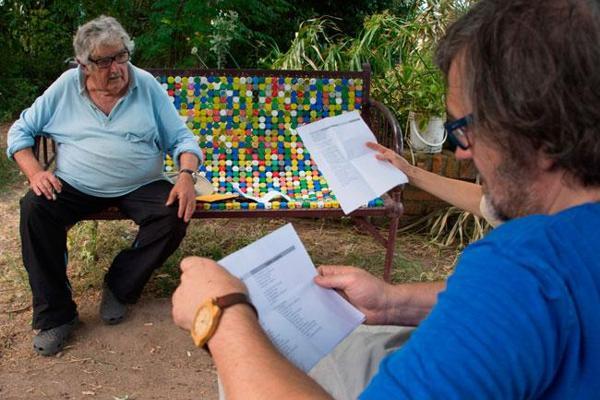Uruguay awaits ex-president Mujica’s next political move
MONTEVIDEO – Agence France-Presse


Uruguay’s charismatic former guerrilla-turned president Jose “Pepe” Mujica earned international acclaim for his austere ways while in office, and for his efforts to legalize marijuana, abortion and same-sex marriage in his traditionally conservative country.
Two films centering around the 83-year-old politician’s life are due to premiere next month at the Venice Film Festival, putting Mujica right back in the global spotlight he craves.
But back home, the mustachioed leftist is a divisive character, chided over his economic record as much as he is lauded for his seemingly utopian vision.
And a cryptic message after leaving the Senate saying he would now dedicate himself to the “ideological battle” has left many speculating whether he will make another run for the top job next year in the South American country.
Abroad, the trailblazing Mujica earned praise during his 2010-2015 presidency for social progress and for shunning the lavish lifestyle that attracts many to a life in politics, giving away much of his presidential salary and living on a modest flower farm.
But he left a bloated government and his macroeconomic results “were bad,” liberal economist Javier de Haedo told AFP.
“His government ended with a fiscal deficit of 3.5 percent of GDP that pushed the public debt onto an unsustainable path,” the economist said, adding that “uncontrolled public spending” had not helped education and infrastructure.
Sebastian Sabini, a young deputy from Mujica’s MPP party, sees things differently, insisting that a deeper look at the ex-leader’s economic record shows “significant job creation, reduction in inequality and increased incomes.”
When current President Tabare Vasquez succeeded Mujica in 2015, he inherited deteriorated public finances and a ticking time bomb that was state oil monopoly ANCAP’s massive debt.
But Vasquez -- who also preceded Mujica as president in Uruguay’s single term system -- has seen his popularity nosedive, paving the way for the farmer to make another run.
Earlier this month, in the letter announcing he would step down from the Senate, Mujica said he had become “tired from the long journey.”
But he said: “As long as my mind is still working, I cannot walk away from the ideological battle.”
Before entering politics, Mujica was a leader of the armed left-wing Tupamaro rebel group, nicknamed the “Robin Hood” guerrillas for some of their unique insurgency methods, like robbing banks and then giving money to the poor.
But the group also committed violent crimes, including kidnappings and murders, for which Mujica remains unapologetic.
“He still doesn’t acknowledge the enormous responsibility the MLN had in the fall of democracy,” said political scientist Francisco Faig.
Shot multiple times in 1970, he was later imprisoned for 13 years under Uruguay’s military dictatorship, often in solitary confinement, until he was freed under an amnesty in 1985.
Mujica says his prison ordeal gave him time for introspection and now he believes that “nothing is more important than life.”
He later went into politics, serving as a lawmaker and agriculture minister before winning the presidency -- and stood out for his quirky rural lifestyle.
Early next month in Venice, Serbian director Emir Kusturica will debut his documentary about Mujica, “El Pepe: A Supreme Life.”
A second film, “The 12-Year Night” -- a dramatization about the military dictatorship and the imprisonment of Mujica and others -- will also be screened for the first time in Venice.
But the debate over his record rages on.
For Sabini, “the contribution of Mujica’s government when it comes to human rights is undeniable.”
The lawmaker also pointed to “improvements in legislation regarding domestic workers” and the implementation of an “eight-hour work day for rural workers” as examples of Mujica’s achievements.
But Faig disputes that version, saying Mujica came to power with both “internal legitimacy” thanks to his Broad Front coalition and “international prestige” -- but left the country with greater government corruption a fact of political life.
“No serious reform was carried out on the issues that matter to the country,” Faig said.
When Uruguay goes to the polls next year, few would be surprised to see Mujica’s name on the ballot paper -- and then voters can decide.
